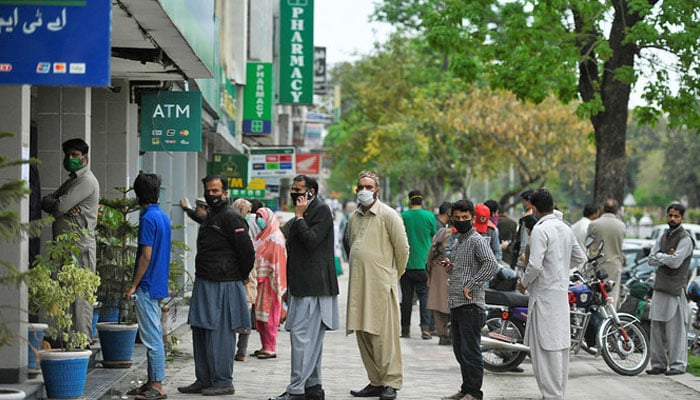Banks must cut deposits by Rs3.6tr by Dec to avoid ADR tax
KARACHI: With tax implications related to the advance-to-deposit ratio (ADR) looming, banks must act swiftly to reduce deposits and increase loans in the last months of 2024, according to analysts.
“Banks must extend an additional Rs1.85 trillion in loans or reduce deposits by Rs3.6 trillion during the final two months of the calendar year to avoid taxation linked to the ADR,” said Awais Ashraf, director research at AKD Securities Limited.
According to data released by the State Bank of Pakistan (SBP), as of June 2024, 327 accounts hold balances exceeding Rs5 billion. Of these, 92 accounts belong to the government, 87 to the private sector, 77 to non-financial public sector enterprises, 63 to non-banking financial institutions, six to trust funds, one to foreign constituents, and just one to an individual account. Collectively, these accounts hold a total balance of Rs4 trillion.
The SBP’s most recent weekly data shows that as of October 25, banks’ total advances increased 11 per cent to Rs13.4 trillion while deposits decreased 1.0 per cent to Rs30.5 trillion, makes it clear that banks are already stepping up their efforts to increase private sector loans and decrease deposits. As a result, the ADR for the banking industry rose to 44 per cent from 39 per cent a week ago.
The difficult economic climate and scarce lending options have heightened competition in the lending market, leading many banks to prioritise reducing deposits, Ashraf said.
Currently, most banks have implemented a policy of imposing a monthly charge on deposits in accounts holding Rs5 billion or more, he said.
“Approximately Rs4.1 trillion is currently held in high-value accounts mostly held by institutions. However, 92 accounts belong to the government of Pakistan holding a total amount of Rs1.2 trillion, inaction on which can cause loss to the exchequer,” he said.
In response to regulatory pressures, several banks, including HBL, Bank Alfalah, MCB, Meezan, and the Bank of Punjab, have implemented fees ranging from 5.0 per cent to 6.0 per cent on balances exceeding Rs5 billion. Smaller banks have set this fee for balances above Rs1 billion. “This decision aims to discourage large deposits and alleviate the impact of additional taxes imposed on banks with lower ADR,” said Saad Hanif, head of research at Ismail Iqbal Securities.
Analysts expect high charges on deposits may redirect liquidity into other asset classes for a short period. In particular, equities and real estate could benefit from this shift, as banks reduce returns on deposits, prompting investors to seek higher yields in alternative investments.
If banks’ ADR drops below 50 per cent or 40 per cent by December 31, they will be subject to an additional tax at rates of 10 per cent and 16 per cent on profits from government securities.
While the tax aims to encourage banks to increase lending to the private sector, it is primarily seen as a way to enhance government revenue, especially in the context of a $7 billion loan programme with the International Monetary Fund (IMF).
Reports indicate that the government plans to approach the Supreme Court of Pakistan (SC) to challenge a stay order issued by the Islamabad High Court against the tax targeting lenders whose private-sector lending does not meet established thresholds.
Analysts are keeping an eye on whether ADR taxation will be computed as an average for the entire year or based on year-end figures, depending on the outcome of the ADR case.
-
 Fresh Details Of King Charles, Queen Camilla's US Visit Emerge Amid Andrew Investigation
Fresh Details Of King Charles, Queen Camilla's US Visit Emerge Amid Andrew Investigation -
 Iran 'set To Buy' Chinese Carrier-killer Missiles As US Forces Gather In Region
Iran 'set To Buy' Chinese Carrier-killer Missiles As US Forces Gather In Region -
 Prince Harry And Meghan Unlikely To Meet Royals In Jordan
Prince Harry And Meghan Unlikely To Meet Royals In Jordan -
 Hero Fiennes Tiffin Shares Life-changing Advice He Received From Henry Cavill
Hero Fiennes Tiffin Shares Life-changing Advice He Received From Henry Cavill -
 Savannah Guthrie's Fans Receive Disappointing News
Savannah Guthrie's Fans Receive Disappointing News -
 Prince William Steps Out For First Solo Outing After Andrew's Arrest
Prince William Steps Out For First Solo Outing After Andrew's Arrest -
 Jake Paul Chooses Silence As Van Damme Once Again Challenges Him To Fight
Jake Paul Chooses Silence As Van Damme Once Again Challenges Him To Fight -
 Google Disrupts Chinese-linked Hacking Groups Behind Global Cyber Attacks
Google Disrupts Chinese-linked Hacking Groups Behind Global Cyber Attacks -
 Four People Killed In Stabbing Rampage At Washington Home
Four People Killed In Stabbing Rampage At Washington Home -
 Meghan Pushes Prince Harry Into Territory That’s Dangerous To His Brand: ‘She Isn’t Hearing A Word Of It’
Meghan Pushes Prince Harry Into Territory That’s Dangerous To His Brand: ‘She Isn’t Hearing A Word Of It’ -
 Christina Applegate Reflects On Lasting Impact Of Being Molested In Childhood
Christina Applegate Reflects On Lasting Impact Of Being Molested In Childhood -
 Martin Short Makes Big Decision Following Tragic Death Of Daughter
Martin Short Makes Big Decision Following Tragic Death Of Daughter -
 Antarctica’s Mysterious ‘gravity Hole’: What’s Behind The Evolution Of Earth’s Deep Interior?
Antarctica’s Mysterious ‘gravity Hole’: What’s Behind The Evolution Of Earth’s Deep Interior? -
 Hilary Duff Addresses Ashley Tisdale's 'toxic Mom Group' Claims And Matthew Koma's Firey Response
Hilary Duff Addresses Ashley Tisdale's 'toxic Mom Group' Claims And Matthew Koma's Firey Response -
 Jack Hughes's Proximity To Trump Angers Tate McRae Fans
Jack Hughes's Proximity To Trump Angers Tate McRae Fans -
 Neve Campbell Opens Up About Her 'difficult Decision' To Not Sign 'Scream 6'
Neve Campbell Opens Up About Her 'difficult Decision' To Not Sign 'Scream 6'




